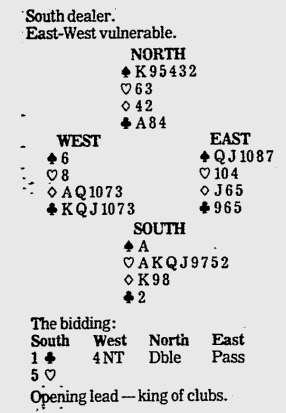Reading Eagle – 20 Ago 1984 by Jay Becker

The opponents bidding sometimes draws a roadmap for declarer to follow that he would be unlikely to find had the opponents remained silent. For example, take this deal played by four-time world champion Bob Hamman at a U.S. national championship.
Hamman’s club bid was artificial and forcing. It promised at least 17 high-card points and could have almost any distribution. West’s four notrump overcall announced a strong two-suiter in the minors. The double by North indicated at least moderate values, and South’s five heart bid closed the auction.
Without a club lead, Hamman would have had no trouble collecting eleven tricks. But West’s king of clubs lead unfortunately cut South off from dummy’s king of spades. As a result, declarer was now faced with the possibility of losing three diamond tricks. However, Hamman carefully utilized his knowledge of West’s hand to bring home the contract.
After taking the club ace, declarer led a diamond to his nine, losing to the ten. As expected, West shifted to a trump. After winning the eight with the nine, Hamman now made his second key play in the diamond suit by returning the king!
West took the king with the ace but, as Hamman expected, he did not have another trump to lead. Declarer ruffed the queen of clubs return, trumped his last diamond in dummy, and in that way wound up making the contract. By playing the diamonds as he did, Hamman prevented East — the player for more likely to hold most of the missing trumps — from ever gaining the lead.
Had Hamman put up the king of diamonds at trick two, or led the eight of diamonds instead of the king at trick four, East would have won the second diamond lead with the jack and returned a trump to put the contract down one.
Esta entrada también está disponible en: Spanish

